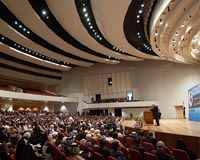| . |  |
. |
Baghdad (UPI) Feb 21, 2011 Amid violent uprisings against autocratic Arab regimes, the Iraqi government says it has taken a novel step to head off trouble: shelving plans to buy 18 Lockheed Martin F-16s and diverting a $900 million down payment to buy food for its poor. Whether that decision was a consequence of the wave of street protests largely driven by poverty, hunger and unemployment, which toppled the presidents of Egypt and Tunisia in the last six weeks, isn't altogether clear. "The contract was postponed and the $900 million that was allocated to it was transferred to support the people," government adviser Tahseen al-Sheikhli said last week in Baghdad. The prospect of Iraq acquiring the F-16 Block 52 multi-role interceptors has caused considerable concern among Iraq's neighbors, such as Iran and Kuwait. They were invaded by Saddam Hussein in 1980 and 1990, respectively, and Saudi Arabia, which was the springboard for the U.S.-led liberation of Kuwait. Even Iraq's Kurdish minority, dreaming of independence, don't particularly want to see a federal government acquiring the kind of firepower the F-16s would give Baghdad against any move toward secession. Tens of hundreds of Kurds were slaughtered by the former Baathist regime's army and air force, particularly under Saddam, from the 1970s. "The people of Kurdistan have fears left by previous governments that the central government may use the military to attack them," explained Qassim al-Araji of Parliament's defense and security committee. Iranians also have bitter memories of Iraqi aggression. During the 1980-88 war, triggered by Saddam's bid to seize the main oil fields of the infant Islamic Republic, Tehran and other cities were pounded by Iraqi missiles. Hundreds of thousands of Iranians were killed in the conflict that ended in stalemate. Iran doesn't want to see that happen again and Tehran is determined to ensure Iraq never becomes a military power again. Given that Iraq's new government is dominated by Shiites, many of them influenced, if not controlled, by Tehran, the decision to postpone the acquisition of F-16s could indicate pressure from the regime in Iran. That said, some 6 million of Iraq's estimated 22 million people are plagued by poverty and hunger -- exactly the hardships that drove long-suffering Egyptians, Tunisians and others to unleash street protests against their rulers. Iraqi Prime Minister Nouri al-Maliki, who struggled for nine months to form the current coalition, doesn't want to see that challenged in a similar fashion. But whatever the reason for delaying the initial F-16 acquisition, Iraq faces a big problem as the U.S. military withdrawal moves toward its scheduled completion at the end of the year. U.S. and Iraqi commanders agree that Iraqi state forces, trained and armed by the Americans, remain unequal to the task of ensuring national security without U.S. help for at least the next five years. The Iraqi air force commander, Lt. Gen. Anwar Hamad Ahmed, has admitted his force will be too weak to defend the country until 2020, largely because of the lack of combat aircraft. It's here that another factor enters the equation. The French, a key military supplier in Saddam's day, are driving to open that market again. Paris has offered to sell Baghdad 18 upgraded Dassault Mirage F-1 fighters for $1 billion. That's a fraction of what 18 F-16s would cost -- plus deliveries of the U.S. jets weren't expected to start until 2013. The French say Iraq could have the Mirages this year. The Americans want to dominate the arms market in Iraq and the political fallout for Baghdad in snubbing Washington to buy from Paris may well be too onerous to contemplate. Baghdad has cited budgetary problems on weapons purchases in the past. But with oil prices topping the $100 a barrel mark again and Iraqi exports climbing, revenue may not be too much of a problem. Still, "the purchase of F-16s is one of many budget decisions they must take," said U.S. Army Col. Barry Johnson, a U.S. military spokesman. "Any impact a decision to postpone the purchase of F-16s may have is just one of many factors the Iraqi government will have to weigh in considering its future security arrangements."
Share This Article With Planet Earth
Related Links Iraq: The first technology war of the 21st century
 Iraqi MPs pass $82-billion 2011 spending programme
Iraqi MPs pass $82-billion 2011 spending programmeBaghdad (AFP) Feb 20, 2011 Iraqi lawmakers approved an $82-billion spending programme for 2011 by voting for a national budget in parliament on Sunday. Overall expenditure will be $81.86 billion, or 96.6 trillion Iraqi dinars, while income is projected at $68.56 billion, leaving a shortfall of $13.3 billion - a budget deficit of around 16 percent. The budget is based on average oil prices of $76.5 per barrel and ... read more |
|
| The content herein, unless otherwise known to be public domain, are Copyright 1995-2010 - SpaceDaily. AFP and UPI Wire Stories are copyright Agence France-Presse and United Press International. ESA Portal Reports are copyright European Space Agency. All NASA sourced material is public domain. Additional copyrights may apply in whole or part to other bona fide parties. Advertising does not imply endorsement,agreement or approval of any opinions, statements or information provided by SpaceDaily on any Web page published or hosted by SpaceDaily. Privacy Statement |